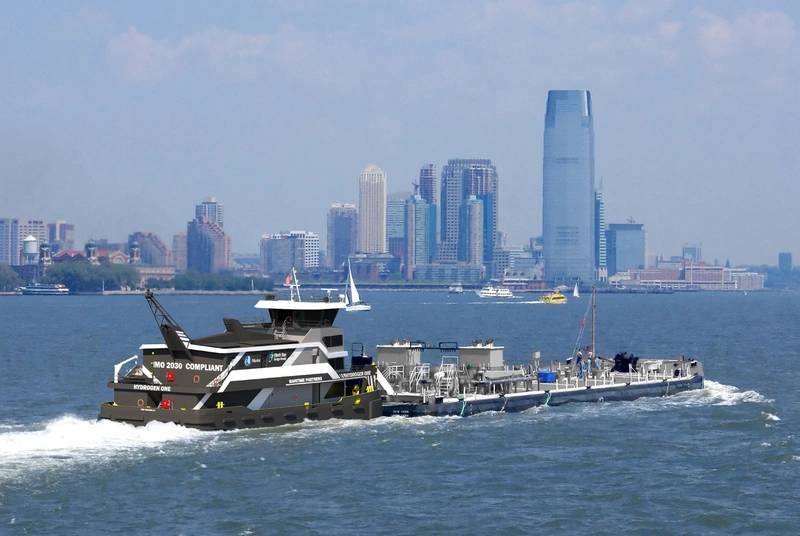Maritime Partners, USCG Ink Design Basis Agreement for Innovative Hydrogen One Towboat
The developer of an innovative towboat engineered to run on hydrogen generator technology has signed a Design Basis Agreement (DBA) with the U.S. Coast Guard, helping to clear the regulatory path toward the vessel's eventual entry into service.
The first-of-its-kind vessel, Hydrogen One, is being produced by Maritime Partners, the Metairie, La.-based maritime financing company that unveiled plans for the groundbreaking towboat in 2021.

Designed by Seattle-based Elliott Bay Design Group, the vessel will be the first in the world equipped with e1 Marine's reformer technology, which converts bunkered methanol to hydrogen on demand. Produced hydrogen will run through Power Cell fuel cells, creating electricity for the vessel’s motors, which drive dual L-drive azimuth thrusters.
A successful string test in June 2023 proved the viability of the methanol-to-hydrogen system and fuel cells as a standalone propulsion power source, but the project has fallen behind its target launch date, largely due to the regulatory challenges associated with the installation of new technologies.
Innovators in the U.S. maritime industry, including the partners behind the Hydrogen One project, have been slowed by a regulatory environment that has struggled to keep pace with recent technological advancement.
In a move that aims to facilitate innovation when standards for new pieces of technology do not yet exist, the U.S. Coast Guard established the DBA process, which sets the rules for novel technologies proposed for installation on board marine vessels.
Maritime Partners said the recent signing of the DBA essentially ensures that the Hydrogen One project partners are working toward an agreed upon framework with the U.S. Coast Guard for the design, arrangement and engineering aspects of the power system and associated safety systems for plan review, inspection and certification of the new towboat.
“The signing of this agreement opens the pathway for us to deploy our technological capabilities,” said Bick Brooks, co-founder and CEO of Maritime Partners. “With this, Hydrogen One is one step closer to becoming the world’s first vessel to utilize hydrogen generator technology greatly reducing emissions, increasing efficiency and providing a model for cleaner energy use as the industry continues to seek ways to decarbonize.”
Notably, Hydrogen One's cleaner-burning propulsion system will emit no nitrogen oxide (NOx), sulfur oxide (SOx) or particulate matter (PM) pollution.
“Maritime Partners is strongly committed to developing and utilizing sustainable, clean energy solutions, as the entire maritime industry continues to seek alternative fuel options that are cleaner, greener and more efficient. The development of Hydrogen One is part of that commitment,” said Dave Lee, Maritime Partners’ VP of Technology & Innovation.
Once the Hydrogen One's regulatory hurdles are cleared, Bourg, La. shipyard Intracoastal Iron Works will build the vessel, which is expected to be operated by Jeffersonville, Ind.-headquartered marine transportation company American Commercial Barge Line (ACBL), likely to move petroleum products in and around Louisiana and Texas. A tentative delivery date has not been determined.
"We are taking a methodical approach to the build program which includes getting many of our novel technology systems approved before we start construction," Lee said. "Just like the process of getting the DBA, this will assure that we will not be cutting the boat up for modifications during the build process."
